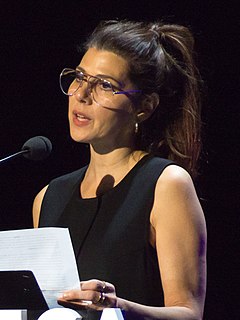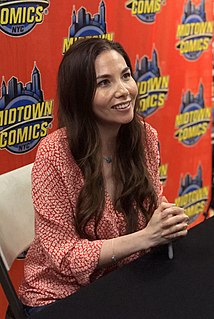A Quote by Ted Dekker
All my books are very spiritual. I started out writing what was most natural to me, many years ago, which is religious, because I grew up in the jungle, the son of missionaries. I want to know, is God real? What's a priest's role?
Related Quotes
We think we have to prove our allegiance to God by being poor. Many years ago, my own psychic development teacher taught me that to be on a spiritual path meant that you needed to be poor, because that was proving your allegiance to God. So growing up with that kind of teaching from her was a real struggle for me, also.
My favorite leader is George Washington. Because he came from very modest circumstances. He wasn't the son of a plantation owner. He was the son of a farmer. He had no formal education, very frustrated. He started writing a diary when he was in his teens, and he wrote things like, "When I grow up, I want to be respected. When I grow up, I want to be successful. When I grow up, I want to know things." What I find fascinating about Washington is he wanted to make something of himself.
I spent ten years in London; I trained there. But because I started in English, it kind of feels the most natural to me, to act in English, which is a strange thing. My language is Spanish; I grew up in Argentina. I speak to my family in Spanish, but if you were to ask me what language I connect with, it'd be English in some weird way.
I want to tell you about the God that actually showed up and healed my heart. Not the God I grew up, because the God I grew up was fundamentally, and I use the word advisedly, fundamentally untrustworthy -- schizophrenic, narcissistic, unreachable, unknowable, and my concept within which I grew up was that Jesus -- He likes me -- but He came to save me from God the Father -- who was the one who was angry and distant, and unreachable, unknowable. All of that had to come crashing down.
I grew up in a very religious family, so that was never going to leave me. I just accepted it over the years. Although I'm not religious myself, it is so much a part of me. It's a part of my history, a part of my tradition and my culture, so I don't want to just throw it away and leave it behind, because it's made me who I am today.
I am not agnostic. I am atheist. I don’t think there is no God; I know there’s no God. I know there’s no God the same way I know many other laws in our universe. I know there’s no God and I know most of the world knows that as well. They just won’t admit it because there’s another thing they know. They know they’re going to die and it freaks them out. So most people don’t have the courage to admit there’s no God and they know it. They feel it. They try to suppress it. And if you bring it up they get angry because it freaks them out.
Many years ago, our father Ibrahim (AS) made a choice. He loved his son. But He loved God more. The commandment came to sacrifice his son. But it wasn't his son that was slaughtered. It was his attachment to anything that could compete with his love for God. So let us ask ourselves in these beautiful days of sacrifice, which attachments do we need to slaughter?
Well, years and years ago, I started to ask myself three very simple questions, which dominated my life for many years. One of them was, "Why are organizations everywhere, whether commercial, social, or religious, increasingly unable to manage their affairs?" The second question was, "Why are individuals throughout the world increasingly in conflict with and alienated from the organizations of which they're a part?" And the third was, "Why are society and the biosphere increasingly in disarray?"
For me, a lot of Discipline was very personal writing, like writing through and working out being inside this gendered body and also the compulsions of the body, the muting of the mind as driven by the body. My father had died some years ago so he haunts the book too, just floats through it ghost-like. But, the writing of every book is different for me. They are so like living creatures, these books, so I don't know what's carried over into the writing of the next things - except maybe that I'm best when I make my writing practice a routine.
Oh, that God would raise up missionaries. I don't wish the same things your parents want for you. They want for you security and insurance and nice homes. They want for you cars and respect. I want for you the same thing I want for my son, that one day he takes a banner, the banner of Jesus Christ, and he places it on a hill where no one has ever placed a banner before, and he cries out, 'Jesus Christ is Lord,' even if it costs my son his life.
I don't want to give advice to people about their religious beliefs, but I do think that it's not smart to bet against the power of science to figure out the natural world. It used to be, a thousand years ago, that if you wanted to explain why the moon moved through the sky, you needed to invoke God.
I started out writing romance novels, and that's a side of publishing that's very female oriented. 99.9% of the writers are women, most of the editors are women, and these are books written for the female gaze. And so my point of view - the way I looked at fandom and publishing and writing - was all about women. So for me that's what was natural, that's what was comfortable. And then I moved over to comics. And all of a sudden it was... Pardon the expression, it was a sausage fest.



































